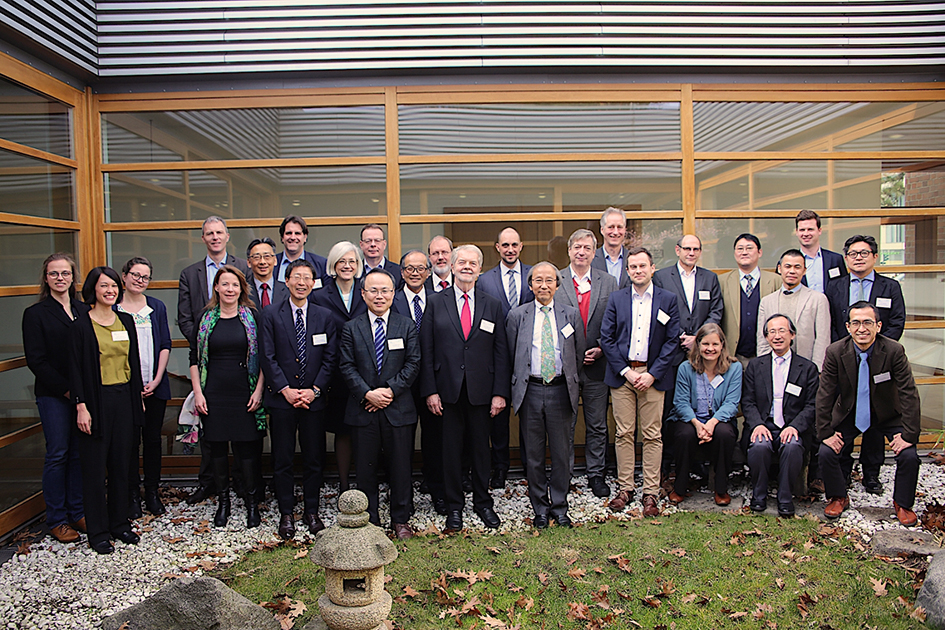How to Digitise the Energy Transition
GJETC establishes new working group on digitisation

GJETC establishes new working group on digitisation


This week the sixth meeting of the German-Japanese Energy Transition Council (GJETC) has been held in Berlin. The first meeting in 2019 took place primarily with a focus on digitisation. A new working group was set up to deal with the issue of "Digitisation and the Energy Transition". At the sidelines of the meeting, members of the GJETC also visited an outstanding sector coupling project that uses surplus energy for heating and cooling.
The GJETC has dedicated one of its newly established working groups to the subject of "Digitisation and the Energy Transition". The Wuppertal Institute and the Institute of Energy Economics, Japan (IEEJ) as the scientific secretariats of the GJETC are currently investigating concepts of virtual power plants and their underlying business models. The focus is on case studies such as the German company Next Kraftwerke and the US energy supplier Pacific Gas & Electric. In addition, the activities of German municipal utilities (so-called "Stadtwerke") in the field of digitisation are of interest. The research group also puts an eye on the heat sector in terms of district heating storage and sector coupling.
Digitisation can enable system operators, producers, traders, consumers and storage providers to co-operate and use the renewable power instead of wasting it. "Utilisation before limitation" is also the motto of the WindNODE showcase project of the German Economic Ministry, which was presented on the 2nd day. The aim is to integrate as much renewable energy into the system as possible while also maintaining the grid stability. New flexibility options through sector coupling and regional power plants are tested to prevent congestions and ensure optimal use of green energy. Following the Council Meeting the German and Japanese experts visited a sector coupling project by GASAG Solutions on the EUREF-Campus, concerned with Power-to-Heat (P2H) and Power-to-Cold (P2C). The system enables the intelligent use of surplus electricity for heating with an electric heater and two storage tanks as well as cooling with two compression refrigerator machines. In addition, the connection to a bio methane CHP can compensate for low supply voltage and keep the system stable. The Japanese Council Members were impressed by the project: "Grid stabilisation is always one of the most sensitive points when talking about renewable energy integration, especially in Japan. The intelligent combination of P2H, P2C and the CHP plant pose an interesting option for the energy supply of districts in the future", said Prof. Yasumasa Fujii from the University of Tokyo.
Focus on bottleneck topics
For the second working phase which started in October 2018, the GJETC installed working groups including Council Members as well as external experts from industry and civil society in order to facilitate a more focused research on five specific topics ("bottlenecks") of energy transition identified in phase one. One of the newly implemented working groups of the GJETC accompanies a comparative study on "The Future Role of Hydrogen in the German and Japanese energy systems". The study includes an analysis of the status quo, a meta-analysis of existing scenarios on the role of hydrogen in the Japanese and German energy systems, and an overview of standards and regulations.
Another working group discusses long-term scenarios of energy supply until 2050 and related review mechanisms, including a study of BDI (Association of German Industries) on "Climate Pathways of Germany". The discussion on how Germany and Japan can close the implementation gaps of their GHG emission reduction goals they committed to come right in time as the future alignment of energy policy are intensively discussed in Germany as well as in Japan in the forerun to the G20 summit in Japan. "Energy efficiency in buildings" is the main topic of another working group within GJETC. At the Council Meeting in Berlin, the GJETC members discussed with external experts about building politics in the Light of COP 24 results with external experts from the German Industry Initiative for Energy Efficiency (DENEFF) and the Federal Institute for Research on Building, Urban Affairs and Spatial Development (BBSR).
The next scheduled Council meeting will be held Tokyo in September 2019. A video on the concept and work of the GJETC as well as study results, input papers, and a final report of the 1st phase (in English, summaries in Japanese and German) can be downloaded from the GJETC website.
